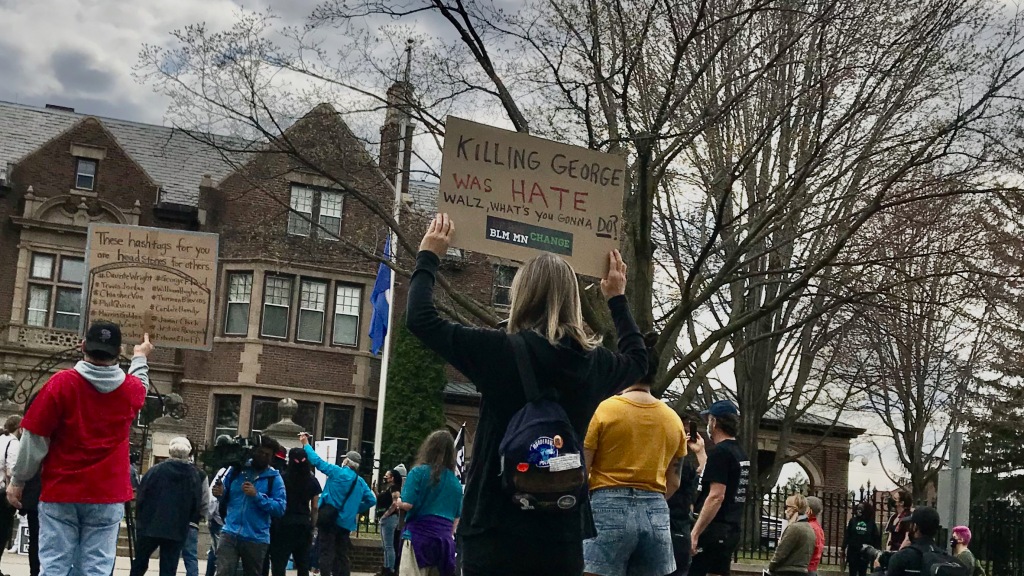
(photo from the 04.18.2021 protest in front of the Governor’s Residence in St. Paul)
Last Sunday night, a long week ago, I went to bed having just learned the name of another Black man killed by police. We all did.
Two days before that I had posted about the Black Army lieutenant in Virginia who narrowly escaped death-by-traffic-stop. “Again, a Black man…..at the hands of police” I wrote.
“Again, a Black man dies at the hands of a police.” This time it was Daunte Wright, a 20-year old from Brooklyn Center.
As I scrolled social media last Sunday, looking for details of what had happened, I saw the familiar posts:
Remember his name. Daunte Wright.
Say his name. Daunte Wright.
Don’t forget his name. Daunte Wright.
I live in the city where George Floyd was killed. I was lying in bed Sunday night remembering nearly a year ago when I watched the video of George Floyd being murdered by Derek Chauvin. As I was writing about it then, I thought, “Is it Floyd George or George Floyd?” I had to look it up, which I only had to do once. George Floyd. Remember his name. Looking back now, how could we possibly forget?
And as I was lying in bed I also remembered other names — Philando Castile, Jamar Clark, Trayvon Martin, Tamir Rice, Breonna Taylor. I didn’t have to wrack my brain. I haven’t forgotten their names either. I prayed for them too, in my own way.
My mind looked for the names of white men killed at the hands of police, but none came to me that night.
But in the morning more names came – –
Sandra Bland. Another remembered.
Freddy Gray. Another name said.
I’m tired of only remembering. Of only praying. Remembering and praying are not good enough.
I’m tired of us, the white ones, deciding that we can just remember all these names and not do anything about them. Inaction is a decision and a privilege. So is looking away.
In the week since I started writing this piece we learned of Adam Toledo, the 13-year old in Chicago who was shot and killed by police, adding to the long list of names to remember.
There’s a meme making the rounds:
White supremacy won’t die until white people see it as a white issue they need to solve rather than a black issue they need to empathize with.
The Democrats in the Minnesota House have put together a package of bills to address policing. The MN Senate is led by a mini-Mitch called Paul Gazelka who is foot-dragging, hemming and hawing, and making excuses. I’m not sure if the GOP even wants to remember that people are being killed by police, much less act. The bills drafted by Democrats include:
- Outlawing white supremacy in law enforcement
- Ending the Statute of Limitations for Lawsuits for Wrongful Deaths Caused by Police
- Strengthening Civilian Oversight
- Ending Police-Only Responses to Mental Health Crisis Calls
- Ending Qualified Immunity
- Establishing an Independent Investigatory and Prosecutory Body for Police Critical Incidents
- Ending Prosecution for Reporting Police Misconduct
- Ending No Knock Warrants
- Requiring Police to Carry Professional Liability Insurance
- Requiring Access to Body Worn Camera Footage in Police Critical Incidents within 48 Hours
White supremacy won’t die until I, a white person, see it as a white issue that I need to solve rather than a black issue that I need to empathize with.
I’m not involved in politics because it’s a relaxing hobby, like knitting. It’s not helping me to stay healthy, like running. It doesn’t satisfy my need for instant gratification, because even though the arc of the universe may bend toward justice, it also is very long, and moves very slowly. Ask Shirley Chisholm or Stacey Abrams.
I’ve gotten involved in politics because police are killing Black men, and I want it to stop. Could I be more clear? Try this – – I’m involved in politics because police are killing Black people and people of color and I want it to stop. Government is not the only entity upholding white supremacy, but it’s one. Laws are not the only part of a racist system, but they’re part of it. Policing is not the only thing that needs to change, but it’s one thing.
I’m part of a group, Indivisible Saint Paul, that helps keep me active and motivated. One thing we do is hold a weekly “Happy (Action) Hour.” We had a hunch that peopled wanted to take action, but needed a nudge, or help, or reason to be accountable. Every Monday we get together over Zoom, we review a specific piece of legislation or issue, we talk through a suggested script, we put ourselves on mute and then we make a call, send an email, or sign a petition. Today, among other things, we called to demand that the Minnesota legislature pass at least some of those police accountability bills and stop the militarization of policing.*
Nothing is going to change, ever, if systems don’t change. And one of the ways to make systemic changes is to insist that our lawmakers act. That is my path right now. Your path may be different, but my desperate hope is that we all find a way to be a part of the solution.
We can complain, we can empathize, but we can’t expect anything to change if we don’t act. That is also what we need to remember.
White supremacy won’t die until we, white people, see it as a white issue that we need to solve rather than a black issue that we need to empathize with.
*If you want to form your own “Action Hour” group, get in touch and I’ll share with you how we got ours going.
Books:
Me and White Supremacy, by Layla Saad
How to be an Anti-Racist, by Ibram X. Kendi
White Rage by Carol Anderson
